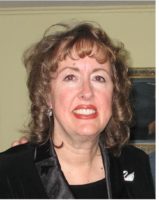Anne, Anaplastic Large Cell Lymphoma Survivor

Anne, Anaplastic Large Cell Lymphoma Survivor
In February of 1998, I noticed a painful small lump in my right armpit and immediately went in to see the doctor. They assumed it was an infected ingrown hair and put me on antibiotics. Over a two-month period, I became more sick and the swelling in my armpit more painful and pronounced. By April, the affected arm had swollen to twice its normal size. After going to the Emergency Room, I was admitted to the hospital the next day. I was there for two and a half weeks being tested for every disease known to man. Finally, they did a surgical biopsy of a lymph node, and the pathology report came back with the diagnosis of lymphoma.
Before I was diagnosed in the hospital, my husband and I both suspected that I had cancer. So, it wasn’t shocking when it was confirmed. In fact, I don’t think I cried. The only time I ever cried was when I thought about my 9-year-old son. Thinking about him made me feel emotional and I wondered if I was going to survive. My life path had been turned upside down, and I had to somehow get my bearings again. It was a very odd feeling, like being a balloon that lost its tether, but that feeling only lasted a couple of days. I made the decision to survive, whatever effort it took. I took over the management of my treatment and my medical visits, which gave me back a feeling of control.
“My life path had been turned upside down, and I had to somehow get my bearings again.”
I immediately started chemotherapy treatment which lasted for a year. I was being prepared for a stem cell transplant, which couldn’t occur until it was clear that I was responding to chemotherapy in a positive way. I ended up getting an autologous stem cell transplant in September of 1999, which means that my own cells were used. Over the course of my treatment, I would drive myself to chemotherapy every month. My family was very willing to help, but I incorporated my treatment into my life. That allowed me to create a routine; each month, for one week, I’d have to receive chemotherapy, and the other three weeks I would be able to live my life as I normally did. I went online and joined a digest for people who shared information on lymphoma.
I am extremely grateful that I have been cancer-free since my Stem Cell Transplant in the fall of 1999. That’s twenty-two years of life so far, twenty-two years of experiences, that were so uncertain back then. In the year or two after my transplant, I had to get over the feeling that my cancer might return (like a sword hanging over your head). Eventually, you realize that a cold is just a cold, nothing more. During that early period, I divided my life into two parts: the innocence Before Cancer (B.C.) and the reality After Diagnosis (A.D.). At this point in my life, I realize that it is all a part of your life experience and what makes you the person you are today, whether it be a long time or a shorter one. There is much to learn from cancer – living in the present and appreciating every day.
I’m involved with the Lymphoma Research Foundation (LRF) as a member of their Lymphoma Support Network, which is a buddy program. In the program, they match you with someone who has a similar diagnosis or who is looking at similar treatment. After meeting a newly diagnosed patient, one of the things I tell them is that the first 90 days after diagnosis are probably the worst. You’re scared to death. You’re thrown into the medical system in a way that you never thought you would be. At the same time, you’re trying to deal with your emotions and those of your loved ones and friends. It’s a very, very difficult time, but it does get better. You start to gain more control of the situation and adjust to the diagnosis. When you have cancer, it is important to realize that cancer is a very individual disease because of how your body reacts to the chemotherapy and your unique body makeup. Many people do survive, and I tell patients that they have just as much right as anybody else to be one of the survivors.
“I encourage people to be their own best advocate.”
I encourage people to be their own best advocates. I did a lot of reading, and one thing that was very encouraging for me was that every time I mentioned to my doctor a chemotherapy drug that was applicable for my disease, she had already heard of it and was able to talk to me about it. It was encouraging knowing how informed she was and that she was staying on top of the latest developments. Nobody cares about your life as much as you do. So, don’t be afraid to get a second opinion, and don’t be afraid to question your doctor. Good doctors aren’t threatened by that. They welcome patient involvement.
You can successfully come out the other side of this journey and go on to live the rest of your life. It’s a real hope these days — a lot of people are doing it.
